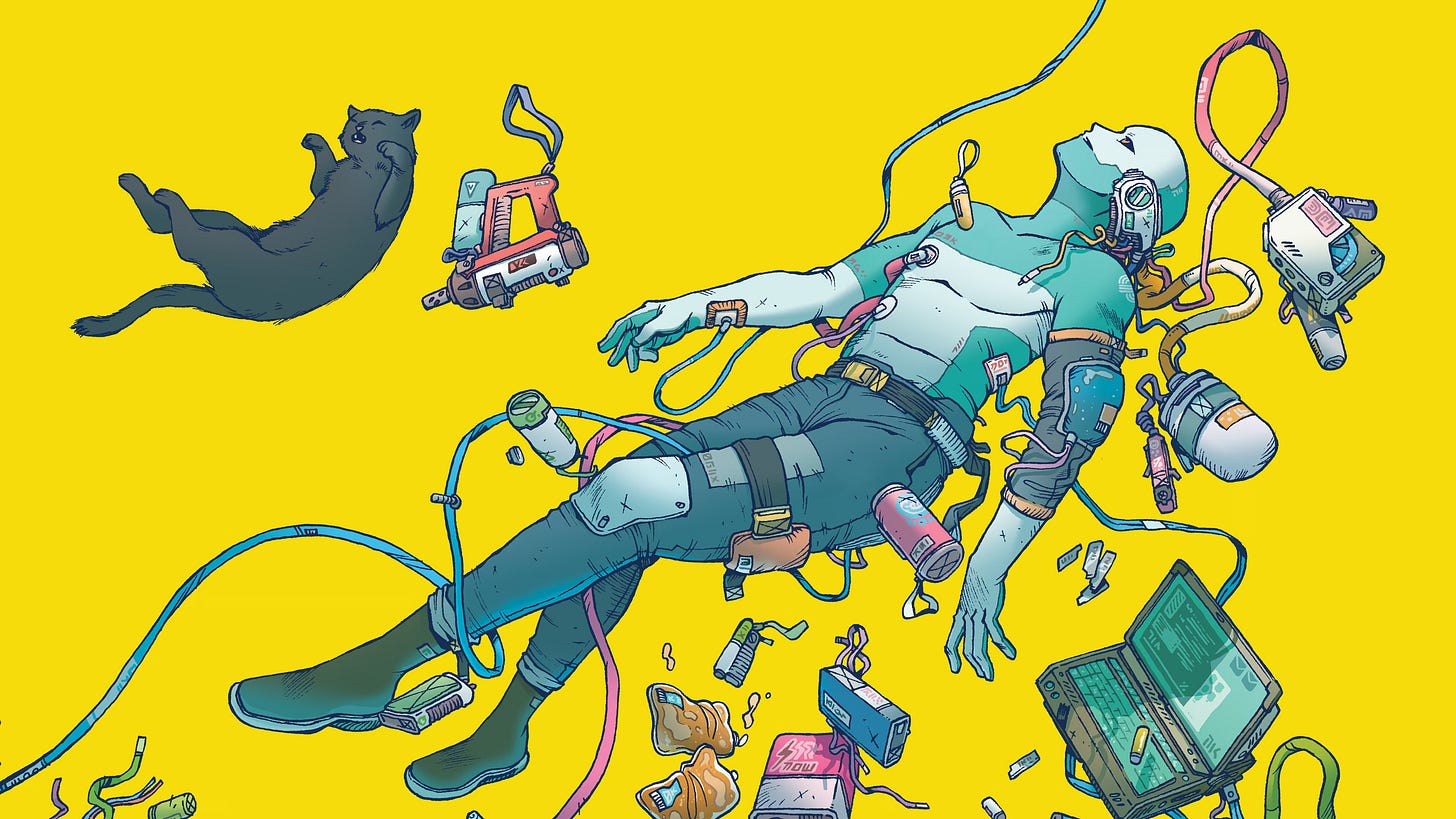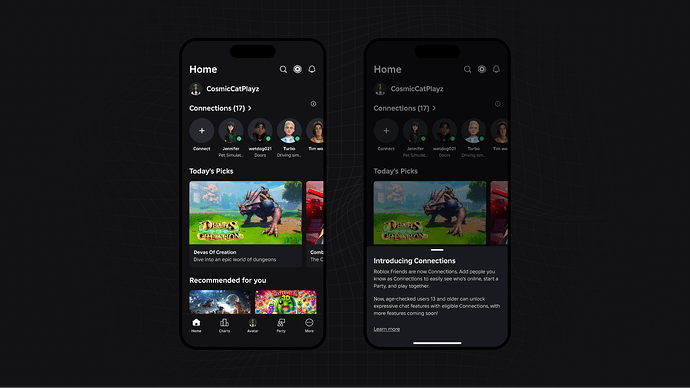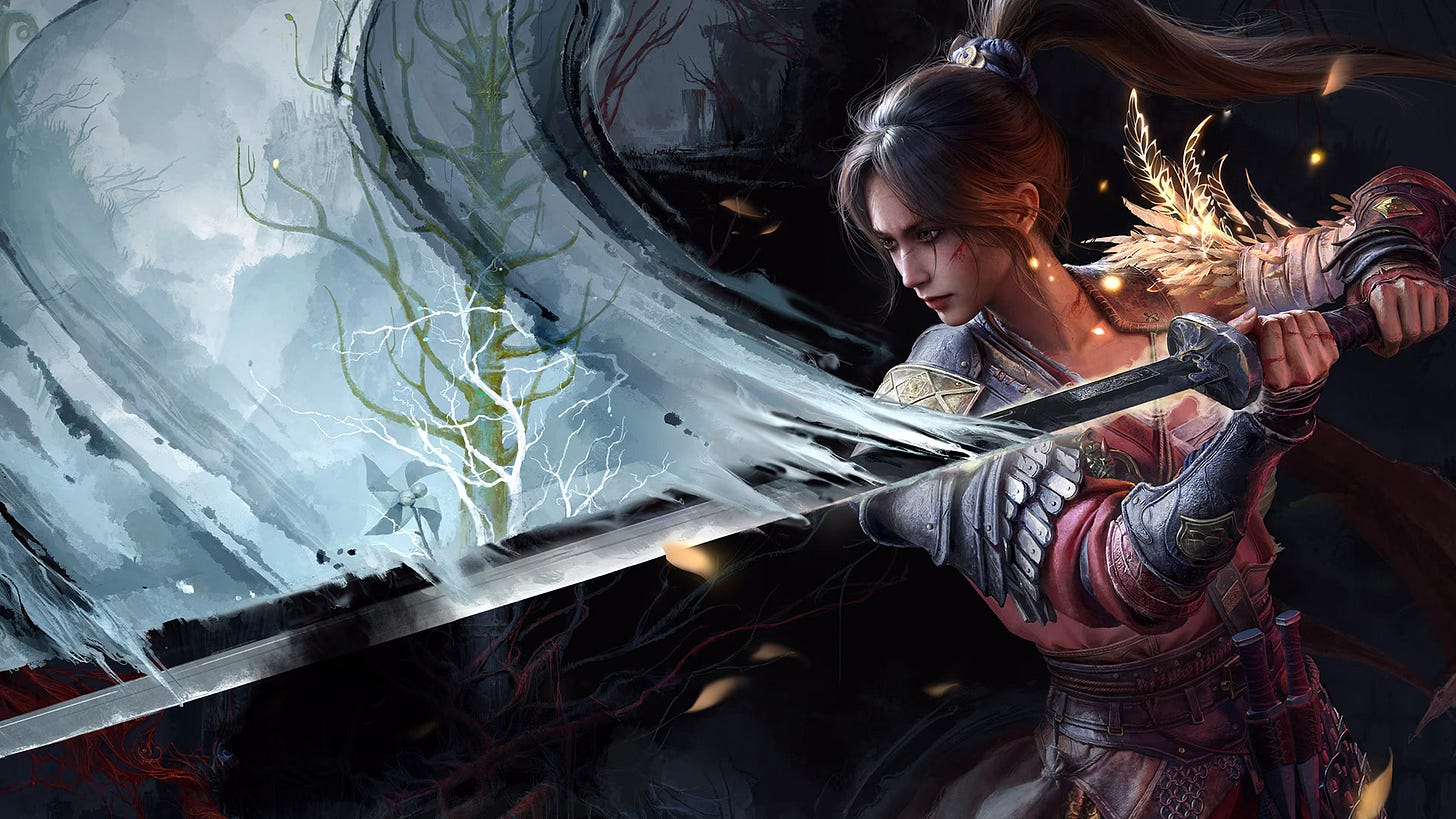The Game Scout’s Secrets, 24/07/2025
Fellow Traveller tell us how publishers discover the indie-credible
Fellow Traveller’s Chris Wright discusses how to find an indie darling
Online Safety Act comes into force, annoying most of the internet in the process
Wuchang: Fallen Feathers becomes my personality of the week
Keep up with VGIM: | Linkedin | Bluesky | Power Play Wishlist | Email|
Hello VGIM-lings,
This week it’s a double Young-er. It’s other George back again for the second week in a row. What a treat for you all.
Those observant of other-George lore will have noticed that I love a natter, and this week I was lucky enough to chat with Chris Wright, managing director of Fellow Traveller, the publisher of tip-top narrative-driven games like Citizen Sleeper 2, Paradise Killer, and 1000xResist.
Over the last few years, the publisher has succeeded by selling spectacular narrative indie games at a price point that players can come on board with.
And in a world where Nintendo is selling first-party games for £75 and there are more games than ever in the market - no thanks to you, generative AI - that’s pretty darn good.
But how does a publisher like Fellow Traveller find the games it brings to market? And what does that tell us about how hit games are discovered across the market?
Read on as Chris spills the secrets of video game scouting.
The big read: The Game Scout’s Secrets
Tickling the pickle: Finding the next great indie game to tickle the public’s pickle is hard. I know this because I’ve been in the media for a decade and have first-hand experience of trying to spot the next ‘overnight’ indie hit.
Dealt cards: I had an appointment with an indie publisher at gamescom a few years ago. After taking me on a whirlwind tour of its upcoming games, the PR pulled out a Steam Machine to show me a deck-building roguelike that the publisher had signed yesterday. I made a note of the name and didn't think about it again until it was released in early 2024.
Pixel play: That game, it turned out, was mega indie hit Balatro. Playstack’s then PR manager, now communications director Wout van Halderen, had already spotted its potential because no one in the office could stop playing it after signing it. But he has also spoken at length about how Balatro, like Playstack’s other big hit The Case of the Golden Idol, was a “pain in the ass” to market because its mechanical elegance didn’t translate into a shiny trailer.
Delayed gratification: And I get it. When I first saw Undertale, my reaction was “this is the game everyone is going wild for?” Meanwhile, BAFTA award-winning Vampire Survivors took a year to gain traction at a bargain bin price point and caught the odd unfair pelter for being a Game of the Year that looks like it clambered out of the 1990s.
Saturating Steam: This difficulty that these hit games faced when being discovered isn’t surprising when you look at the rest of the market. Roughly 10,500 games have launched on Steam this year, even with a third of the year to go. And that’s not counting the thousands of games quietly in development, looking for someone to help it get to market in the years ahead.
Scouting for games
Top of the pile: This has led to one big question: if players are inundated with games, how can my game get to the top? Getting a good publisher who has an eye for quality, a grasp on storytelling, and the smarts to play to a game’s strength can make a big difference. And securing a publisher is often all about being scouted and signed up to a deal.
Down and Scout: In this busy market, that’s difficult to do. But people like Chris do what they can to put themselves in front of as many games as possible to give developers a fighting chance of being discovered. “The scouting process is one of the most fun parts of the job,” he says. “You get to see lots of games and talk to lots of good people.”
Publishing practicalities: What does scouting for a game look like? It might be reading a well-timed email. Chris claims that Fellow Traveller reads every single pitch email it receives, unlike certain other Georges who write this newsletter (You’re fired - Editor). Scouts also love to get out and about, with Chris attending events and scouring its own LudoNarraCon to find the next big thing.
Done deal: Snaring the interest of a scout is also all about timing. Games that already have public demos like you see in Steam Next Fest are usually so deep in development that publishers can’t add as much value. That’s why they’re keeping an eye out for word of mouth recommendations, social media hype, and an interesting press release - no, that’s not an oxymoron - to get on a game early.
Fan mail: And if you’re very lucky, you might receive a direct email from a publisher if they think their expertise can make your next game project go bang. “Sometimes we see a game we didn't publish that we could see fitting on the Fellow Traveller catalogue,” Chris said. “We'll reach out to them and say, ‘hey, what's next?’ and have a chat.”
Build-A-Brand
I game, therefore I am: As Chris has just shown, a publisher is more likely to approach you if your game or previous releases fit with the philosophy they have about what works in the games market.
Portfolio play: Some publishers like to take a wide look at the games they bring to market. Harvey Elliot, CEO of aforementioned Balatro publisher Playstack, told Game Developer that the only thing uniting the company's library is its logo.
Targeted approach: But other publishers like Fellow Traveller take the opposite approach and focus on a niche that it owns. The company has built its brand by publishing narrative-focused games, particularly those exploring stories from people of diverse backgrounds. It even successfully published its first game around the same time that God of War creator David Jaffe infamously said that focusing on narrative was "a bad idea, waste of resources, of time and money, and worst has stuffed the progress of video games to our own peril."
Trend setter: This focus gives Fellow Traveller a defined place in the market. In a similar way to Lost in Cult specialising in making great stuff that you can hold in your hands, Fellow Traveller’s long-term support for story-driven games has found it a space in the market. Sticking to a niche can establish what your business stands for. This earns good will with a player base, which leads to repeat custom for the publisher’s games. This makes it easier for Fellow Traveller to approach studios to support their games and for companies to pitch them.
Creative control: It also creates a virtuous cycle for the publisher, especially when the developer feels valued. “We have developers maintaining creative control baked into the contract,” Chris tells me. “We're not game developers, [and] if they start just doing what the publisher tells them to do, they'll no longer have that creative drive.” That’s why Fellow Traveller keeps out of the creative decision-making process.
Flying the nest: And this approach works even better when a publisher accepts that a developer might go on to bigger, better, or different things elsewhere. “It's great to see teams like Kaizen [Game Works] who we did Paradise Killer with go on to something much bigger than we could afford with Promise Mascot Agency,” Chris explains. “We love to see that happen.”
Structural support
But but but: Building a successful publishing brand around a niche means risk too. Fellow Traveller’s commitment to diverse narrative storytelling is its strength. But it also creates a weakness. “A lot of the teams [we work with] haven't shipped a game before,” Chris explains. “And that's deliberate to increase the diversity of our stories.” It is a commendable commitment. But with most of the industry’s business boot-camp ‘accelerator’ programmes asking developers to show that they’ve shipped a game, it does mean that Fellow Traveller is swimming against the tide.
Into position: Their solution for the games that make it into their portfolio is making sure they support all the other bits and bobs that go into a successful release. King of the castle in this regard is positioning a new release for the market, or as Chris puts it, “figuring out how to talk about the game.” Everything that surrounds the game should push for a specific message; what makes the game unique and memorable in the few fleeting moments you can capture people’s attention. And while game developers can do this themselves, a publisher who has done this for lots of games is much more likely to find the pithy line or hook to get a game to stand out.
Successful suffering: And once you’ve got players on the hook, the work has to continue to make sure you reel people in beyond a game’s release “I think one of the misconceptions of publishing is that it's done when the game's out.” Chris said. “But most of the work happens after release.” As Vampire Survivors showed, sales, promotions, community management, additional localisation and selling swanky new content - whether it is extra downloadable content or just a quality of life update - becomes key. The more successful you become, the more work that needs to be done.
Exhibitionists: Success in the modern games business is no longer just about creating a great game. Whether you’re working with a publisher like Fellow Traveller or not, understanding what your niche is, lining it up to a definable audience, and then carefully positioning it is the only way you’ll get people to stop at your virtual Banksy stall at launch (and beyond).
Creative minds: And just like the rest of us stumbling our way through Steam looking for something else to add to our pile of shame, publishers don’t just find Balatro 2. They only find their electric boogaloo when they know what they stand for, when their scouts know what works for them, and when they know exactly what value they can add to developers. And in a tough market, the shared struggle of developers and publishers to find their place could be crucial for fostering the creative studios we desperately need for a brighter industry future.
News in brief
Online Safety Acting: The Online Safety Act properly comes into force in the UK tomorrow and its provisions around age verification have been causing changes (and consternation) across the games biz. Changes to popular services spotted in the past fortnight include: Roblox’s Trusted Connections feature limiting who under 18s interact with; Reddit’s roll out of Persona for age verification services and BlueSky’s use of Epic Games’s Kids Web Service platform for the same purpose; Discord and k-ID teaming up on a range of measures like face scanning, automatically moderating content and new friend request settings. But the poor communication of the act to consumers has led to fury, as people who aren’t boring enough to follow the slow passage of a law suddenly face a verification process that feels invasive.
Boss Nepo Baby: Ubisoft announced the co-CEOs for its new gaming subsidiary, developed with a €1.2billion investment from gaming giant Tencent. The first is Christophe Derennes, co-founder of Ubisoft Montréal and head of Ubisoft’s North American studios, and the other is Charlie Guillemot is described as “both a gamer and technology enthusiast” in the company’s press release. The perfect leader for a multi-billion dollar games business.
UK Game Fund: The government has released an evaluation of the UK Game Fund, believing it will generate between £30 - £58million for the UK economy, and will create 430 full-time roles in the games industry over three years. The summary also revealed that 74% of companies that received these funds believed that they wouldn’t have created their games without the funding. Good stuff!
Losing Steam: Steam has delisted games with “certain kinds of adult-only content" due to pressures from “payment processors and their related card networks and banks,” such as Visa and Mastercard. The move came days after Collective Shout, the deeply conservative think tank masquerading as a grassroots campaign movement, wrote to payment companies to pressure them to cut support for Steam games similar to the highly controversial No Mercy. There is no official list of the now delisted games, but it’s believed over a hundred titles were affected, according to a list compiled by PC Gamer. Developers are most worried by the vague wording of the terms, and that more games could be de-Steamed in the future.
Re-indie devs: Still Wakes the Deep developer The Chinese Room is an independent studio once more. Former parent company Sumo Digital made waves back in February when it made a statement saying it would change focus away from original games back towards its co-development roots. Spike Laurie of Hiro Capital, who supported the buy-out, said, "We are at risk of overlooking these creative gems and letting them be sold to overseas corporations. That’s a travesty.”
Moving on
Christophe Derennes and Charlie Guillemot become co-CEOs of Ubisoft’s new subsidiary… Austin Rysyk leaves Epic Games to join the Recruiting team at Roblox…Paige Dolan has been promoted to Senior Business Operations Manager at Sumo Digital…Alex Ginn has become the Commercial Director at Karta…And Em Stonham joins The Escapist as a Features Writer…
Jobs ahoy
Premier wants someone to be the next Senior Account Executive in its gaming division…CD Projekt Red is hiring for numerous positions to work on Cyberpunk 2 including a Senior Cinematic Designer…8Bit is looking for a Principal Technical Artist to work for an unnamed studio made up of former CDPR devs…Nintendo of America needs a Senior Network Engineer and reading the description I still don’t know what that means…And Respawn wants a new Animation Director to work on Apex Legends…
Events and conferences
Philippine Game Dev Expo, Manila - 25th-27th July
Chinajoy, Shanghai - 1st-4th August
Siggraph, Vancouver - 10th-14th August
gamescom, Cologne - 18th-24th August
XDS, Vancouver - 2nd-5th September
Game of the week - Wuchang: Fallen Feathers
Someone very wise once said, “If you start to build a game now in the hope of picking up on a trend, it's already too late.” Luckily for developer Leenzee, Wuchang: Fallen Feathers, a soulslike action-RPG based on Chinese mythology, was already deep in development by the time Black Myth: Wukong made Monopoly Man millions.
However, Wuchang: Fallen Feathers is not like the other girls. Sekiro and Lies of P put a huge emphasis on parrying over dodging, but Wuchang wants your girl in a flap. High-speed dodging adds to your strength, so fights are a lot more fast-paced than your typical soulslike.
Dark, gloomy worlds are almost sewn into the fabric of what it means to be a soulslike. And while Wuchang has its fair share of skeletons and viscera - likely to the disgusted shock of Chinese censors - it boasts a gorgeous plateau of swift coursing rivers, strong raging fires and forceful great typhoons. It also has long stretches without any enemies, begging you to take in the scenery as if the design was overseen by China’s tourism board.
AA games are truly having their moment. With the rise in costs for AAA games both for developers and players, the discount dealt by dropping just one A is looking more delicious by the day.
Before you go…
Steam big daddy Gabe Newell has taken part in an interview with Zalkar Saliev, a YouTuber with under 1,000 subscribers.
If his choice of low-key interviewer wasn't bizarre enough to land him in this section, his responses sure were.
Describing his daily routine, Gaben reveals that he lives on a boat and goes scuba diving once or twice a day. Alright for some…
Don’t forget: the VGIM Insider Summer Sale is live now. Become an Insider for just £25 per year (or £3 a month) and help support the growth of the newsletter.







